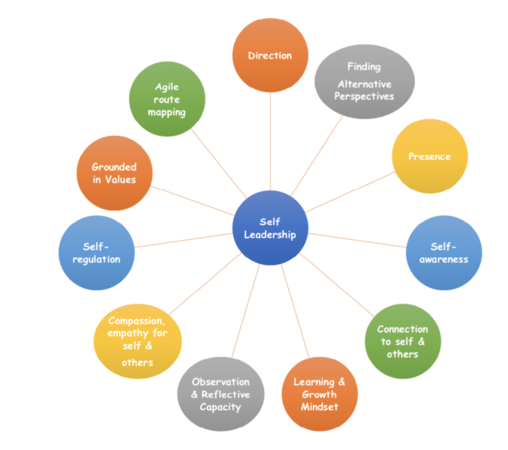Self Leadership
Self-leadership is a Cinderella in leadership studies. Yet it is arguably the most important element for effective leadership of others. Where leaders do not possess the elements of self-leadership they offer poor examples of leadership and pale examples of the qualities of leaders.
The focus here is very much on developing self-leadership and using effective self-leadership in a leadership role. Leaders now, more than ever, need to be relational leaders, aware of other acutely aware of themselves and their own impact, and able to push themselves out of their own comfort zones to work with others to develop interesting, innovative, robust and ever agile solutions for the current and fluid situation in which we find ourselves.
Strong self-leadership across all our life domains has never been more necessary.
Reflection is a key element of self-leadership. It is a pause point when one can take stock and ask questions. Reflection should be scheduled as an important appointment with oneself.
Reflection is about sense-making, meaning-making and learning. It is a jumping off point for new actions, different actions or developing alternative perspectives and attitudes.
There are potentially many obstacles to reflection:
- Not having time
- Not taking it seriously, because it's just a meeting with myself
- The seeming greater importance or seduction of being in action
- Having a deadline and conversely juts being too tired to think right now
- Not knowing how to reflect
- Being concerned about what may be found
There's a downloadable list of questions and prompts below which may help kick start your initial reflective steps. Using the diagram above for themes to reflect on will also be useful. Scheduling a time to reflect will help. Making a commitment for a short reflection time and sticking to it. Having a focus for the reflection.
Kickstart reflection
Use the questions in the download below to kickstart reflection. Use the domains or aspects of self-leadership diagram as prompts to reflect on areas you may want to develop. What are your strengths ? What are your triggers ? What are your values? What do you want to lead? Where are you headed ? What do I fear ? How do I manage or respond to fear? Simple seeming questions maybe, but they will generate a lot of reflective insight.
Reflection.pdfAspects_of_self-leadership_6-16.pdf
Choice & The Learning Mindset
The self-leader will make use of the fruits of their reflection and will confront what life turns up. The self-leader will take such material, insights and data and make some choices. The self-leader is a learner, or as Carol Dweck describes it has "a growth mindset", that is using the challenge and processing what has happened as material to help build a bridge to where next.
The person who is identifying as a learner or having a growth mindset will demonstrate perseverance, and continue to vault their fears and personal barriers, and live strategically towards their goals.
Finding out more about growth mindsets and their value can be found at https://www.youtube.com/watch?v=hiiEeMN7vbQ.
Leadership
There really is no better time to re-think your leadership - personal leadership styles and how we more collectively or co-lead through the inevitable changes that have been imposed on the world; the worlds of work, creativity, home-life and how we begin to re-conceptualize things hitherto taken for granted.
At this point the importance of relational-based understandings of leadership cannot be over-emphasized. Whomever you are leading will not appreciate the command from the front approach at times of isolation, fear and anxiety, when norms, comforts and expectations are overturned.
It is a great time to think about cultivating other styles of leadership, leading from the side, co-designing and co-leading, as well as leading from behind. It is an important time to ensure open communication, to take others' perspectives and concerns into account. It is an extremely important time to court a variety of ways of seeing an issue to maximize generativity in relation to problem-solving and situational development.
Leadership development can be worked on through coaching, through group experiential learning activities, and through working with horses in a leadership program. Whatever the route while coaching and group coaching is supportive to people in potentially isolating leadership roles, it can also offer strategies to support the leadership role such as:
- interrupting more fixed styles of thinking and leadership thinking
- learning to take alternative perspectives
- re-visiting skills of stress management and lateral thinking
- relational awareness and leadership
- self-regulation
- cultivating emotional intelligence - awareness of self and others and the role of emotion is essential for communication and creative problem solving
- developing more skills for stimulating collaborative problem solving
